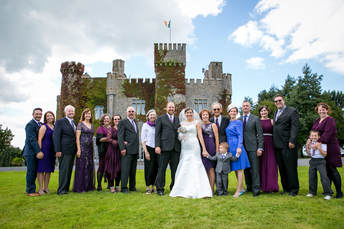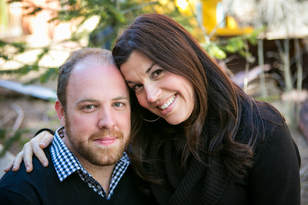 Trust is so important! I always want my hubby to feel like I have his back!
Trust is so important! I always want my hubby to feel like I have his back! One of my favorite concepts is that nothing is either good or bad...it’s all in how we view it. I like to say that you can use a knife to cut a steak or stab someone, neither of which has very much at all to do with the knife. Much in the same way, you can use the words you say to nourish someone or cut them down...it is entirely up to you.
This concept was weighing heavily on me the other day after my husband said something that felt like a like a literal blow to the gut. And I mean full on body tensing, breath holding OUCH!
He said, “I can’t trust you.”
Well that seems like a problem in a marriage, no?
It wasn’t all he said, and fortunately in context, I thought I knew what he actually meant. But that didn’t make the words “I can’t trust you” hurt any less.
I slept on it (to make sure I wasn’t overreacting, as I have been known to do a time or two in my life...and by a time or two I mean HUNDREDS of times). But after giving it a solid sleep & some careful consideration, I decided it was something that I needed to bring up with him.
Fortunately, we have a pretty good history of working out language issues in a way that allows us to easily tackle what could be some pretty touchy topics. I believe I owe this in large part to a lesson I learned from my first facilitation client.
Back in the early days of my business, I used my facilitation skills to help organizations with a lot of process improvement work. I was often brought in by a person high up in the food chain who saw an issue that needed to be resolved. Many times, this issue was not something they could actually help resolve. Instead, we had to get a team of people from across departments in the organization to come together to look at the broken process from start to finish. The person who brought me in was likely only the one who funded the whole shenanigan...but couldn’t actually do any real work in making the process better.
This was the case with my first client. Chuck, the awesome & supportive sponsor who brought me in, would kick off our sessions with an overview of where he hoped we’d end up and then head out to do high level executive type stuff. The rest of the group & I would chug along for 2-3 days at a time evaluating process steps, hypothesizing potential improvements, & coming up with action plans to test our ideas between sessions.
At the end of just about every session I have ever done, I ask the room for “Plusses & Deltas.” Plusses are the things they liked & wanted to see more of moving forward. Deltas (the international sign for change) were things they found discouraging, frustrating, or otherwise didn’t enjoy. If possible, we would try to change as many of those things before the next session as we could.
Well, every day that we ended with the “Plusses & Deltas” exercise, the same thing would show up on the list: Chuck wasn’t here to see how hard we worked.
This concept was weighing heavily on me the other day after my husband said something that felt like a like a literal blow to the gut. And I mean full on body tensing, breath holding OUCH!
He said, “I can’t trust you.”
Well that seems like a problem in a marriage, no?
It wasn’t all he said, and fortunately in context, I thought I knew what he actually meant. But that didn’t make the words “I can’t trust you” hurt any less.
I slept on it (to make sure I wasn’t overreacting, as I have been known to do a time or two in my life...and by a time or two I mean HUNDREDS of times). But after giving it a solid sleep & some careful consideration, I decided it was something that I needed to bring up with him.
Fortunately, we have a pretty good history of working out language issues in a way that allows us to easily tackle what could be some pretty touchy topics. I believe I owe this in large part to a lesson I learned from my first facilitation client.
Back in the early days of my business, I used my facilitation skills to help organizations with a lot of process improvement work. I was often brought in by a person high up in the food chain who saw an issue that needed to be resolved. Many times, this issue was not something they could actually help resolve. Instead, we had to get a team of people from across departments in the organization to come together to look at the broken process from start to finish. The person who brought me in was likely only the one who funded the whole shenanigan...but couldn’t actually do any real work in making the process better.
This was the case with my first client. Chuck, the awesome & supportive sponsor who brought me in, would kick off our sessions with an overview of where he hoped we’d end up and then head out to do high level executive type stuff. The rest of the group & I would chug along for 2-3 days at a time evaluating process steps, hypothesizing potential improvements, & coming up with action plans to test our ideas between sessions.
At the end of just about every session I have ever done, I ask the room for “Plusses & Deltas.” Plusses are the things they liked & wanted to see more of moving forward. Deltas (the international sign for change) were things they found discouraging, frustrating, or otherwise didn’t enjoy. If possible, we would try to change as many of those things before the next session as we could.
Well, every day that we ended with the “Plusses & Deltas” exercise, the same thing would show up on the list: Chuck wasn’t here to see how hard we worked.
 When I facilitate, I try to stay neutral & help people see patterns or behaviors they might not otherwise see.
When I facilitate, I try to stay neutral & help people see patterns or behaviors they might not otherwise see. As a facilitator, I am pretty much Switzerland in every conversation. It’s not my job to take sides. It’s simply my role to hold up a mirror and reflect back to participants what I see happening. In this case, I could show the group that Chuck really cared by bringing in a facilitator to help them solve their problem (after all, I wasn’t a cheap fix!). He was giving them all the resources they needed to create a better process. He trusted them. They understood this...but they still didn’t like the fact he wasn’t there to see how hard they were working. It basically bummed them out.
This meant I had another mirror opportunity. I could show Chuck how his absence was deeply felt by the group.
I started small. In my session write-ups I would include the comment “Chuck wasn’t at the session to see how hard we worked.” No diatribe or explanation...just the comment.
But that didn’t change things. Chuck still wasn’t coming to the sessions.
A few sessions in, I swung by Chuck’s office to see how things were going from his perspective. He seemed pleased & continued to think having me there to usher them through this process was a good investment. I asked what he thought about perhaps coming to the next session. He seemed kind of perflunctacated. Annoyed. His brow actually furrowed a bit. When I dug deeper, it turned out he had seen the comments. Repeatedly, in fact. But he simply didn’t understand why they needed him there since he could in no way help do the actual work.
Since one of my superpowers is helping people understand things through the use of stories & analogies, I dug deep to see what I could come up with for poor, confused Chuck.
“Well Chuck, I think it goes a little something like this. When I was 9, I took a lot of dance lessons. Tap, jazz, hula, clogging, ballet...you name it. My dad paid for me to take all of those lessons because he loved me & wanted me to be happy, much like you are paying for your team to get the help it needs improving its processes. But it didn’t matter to me as a 9-year old how much money he was spending on my dance classes. If he wasn’t sitting front & center at the big recital...he had a pissed off ballerina on his hands. I think that’s what you’ve got going on here. These guys have been working hard & they want you to at least be there for the wrap up each day...that’s THEIR recital. And when you’re not there, you’re creating a room full of pissed off ballerinas.”
When I said this, a big smile came across Chuck’s face as he leaned back in his seat. I was dying to know what was making him grin like that...so I asked.
“Well,” Chuck said, “I just wasn’t like that as a kid. In fact, when I played baseball, it made me really nervous to have my parents at the games. So much so that my performance actually suffered when they were there...so I asked the not to come. I guess I was trying to treat my team like I’d want to be treated by not crowding them...giving them space without feeling like I was hanging over them.”
As we continued to chat about it, we decided we had to share these stories with the team. And as we did, we helped them to create language that would aid them in asking for what they needed in a funny, non-threatening way.
Anytime people were feeling under supported or like they needed a little help, they could simply say, “I’m feeling a bit like a pissed off ballerina over here.”
Conversely, if management was crowding them or watching over them in a way that made them feel nervous or diminished their performance, they could say, “I’m feeling like a baseball player...quit crowding my plate!”
It was brilliant (even if I do say so myself!). They’d found an easy & FUNNY way to have what could have been otherwise difficult or even impossible conversations. All it took was one quick comment for everyone to know exactly what was going on. They had created a common language they all understood.
This meant I had another mirror opportunity. I could show Chuck how his absence was deeply felt by the group.
I started small. In my session write-ups I would include the comment “Chuck wasn’t at the session to see how hard we worked.” No diatribe or explanation...just the comment.
But that didn’t change things. Chuck still wasn’t coming to the sessions.
A few sessions in, I swung by Chuck’s office to see how things were going from his perspective. He seemed pleased & continued to think having me there to usher them through this process was a good investment. I asked what he thought about perhaps coming to the next session. He seemed kind of perflunctacated. Annoyed. His brow actually furrowed a bit. When I dug deeper, it turned out he had seen the comments. Repeatedly, in fact. But he simply didn’t understand why they needed him there since he could in no way help do the actual work.
Since one of my superpowers is helping people understand things through the use of stories & analogies, I dug deep to see what I could come up with for poor, confused Chuck.
“Well Chuck, I think it goes a little something like this. When I was 9, I took a lot of dance lessons. Tap, jazz, hula, clogging, ballet...you name it. My dad paid for me to take all of those lessons because he loved me & wanted me to be happy, much like you are paying for your team to get the help it needs improving its processes. But it didn’t matter to me as a 9-year old how much money he was spending on my dance classes. If he wasn’t sitting front & center at the big recital...he had a pissed off ballerina on his hands. I think that’s what you’ve got going on here. These guys have been working hard & they want you to at least be there for the wrap up each day...that’s THEIR recital. And when you’re not there, you’re creating a room full of pissed off ballerinas.”
When I said this, a big smile came across Chuck’s face as he leaned back in his seat. I was dying to know what was making him grin like that...so I asked.
“Well,” Chuck said, “I just wasn’t like that as a kid. In fact, when I played baseball, it made me really nervous to have my parents at the games. So much so that my performance actually suffered when they were there...so I asked the not to come. I guess I was trying to treat my team like I’d want to be treated by not crowding them...giving them space without feeling like I was hanging over them.”
As we continued to chat about it, we decided we had to share these stories with the team. And as we did, we helped them to create language that would aid them in asking for what they needed in a funny, non-threatening way.
Anytime people were feeling under supported or like they needed a little help, they could simply say, “I’m feeling a bit like a pissed off ballerina over here.”
Conversely, if management was crowding them or watching over them in a way that made them feel nervous or diminished their performance, they could say, “I’m feeling like a baseball player...quit crowding my plate!”
It was brilliant (even if I do say so myself!). They’d found an easy & FUNNY way to have what could have been otherwise difficult or even impossible conversations. All it took was one quick comment for everyone to know exactly what was going on. They had created a common language they all understood.
 Sometimes it's hard to tell fantasy from reality. One day I'm talking about B&Bs in Maine, the next day we are getting married in an Irish Castle! Oh, my poor husband!
Sometimes it's hard to tell fantasy from reality. One day I'm talking about B&Bs in Maine, the next day we are getting married in an Irish Castle! Oh, my poor husband! Flash back to my marriage & the sudden alarm I felt that I couldn’t be trusted by my husband.
After sleeping on it for the night, I asked him more about what he had meant by his comment. He replied by telling me about an incident early in our relationship where my mom & I had gotten all excited about a writing contest where the grand prize was B&B in Maine. Wouldn’t it be fun to win that & own a B&B?!
As mom & I had talked about it with my husband (practically renaming the rooms & pointing out how we’d decorate the thing), he’d been drafting his entry in his mind. He was taking everything we said at face value. Clearly we wanted to be living at a B&B in Maine.
Only...we really didn’t. We just liked the idea of it & had fun getting carried away with the story of what would happen if we won. But who would actually leave warm, sunny Las Vegas to face winters in Maine?! Ew...gross.
It turns out Mom & I do that a lot. A wild idea will cross our paths and we’ll just run with it. All the way to the ends of the earth if we’re in the mood. But only in words...with no real intention of ever acting upon it. The idea bouncing around is all the fun we need. In the span of an hour we can be innkeepers in Maine with more details figured out than someone who actually owns an a dang B&B…no moving boxes required.
And so when my husband said he couldn’t trust me (which really hurt when he said it), what he really meant was he was wondering if what I was saying was another B&B in Maine (which makes me laugh when he says it).
And so now, like my clients with their ballerinas vs. ballplayers construct, we have a way to ask if this is a real brainstorm or a just for fun but never gonna happen brainstorm. All either of us has to say is, “Is that a B&B in Maine?” This makes us laugh (mostly at me). And it keeps things from escalating to the point of damaging the trust we’ve spent years building.
Life’s a journey. We learn as we go. Sometimes we’re pissed off ballerinas. Sometimes we’re overcrowded ballplayers. And sometimes we’re would be innkeepers in Maine. All we gotta do to keep it from being painful is create a common language that makes us chuckle instead of cringe. To use our words in a way that can bring us closer together rather than damaging the closeness we’ve worked so hard to build.
And let’s face it...only one of us over here in Riley Town will ever have to ask about B&Bs in Maine. The other of us (me) will just have to pause for a second to check in with herself. Because in truth, I don’t always know at first. Which is an interesting thing I have learned about myself since living with my husband. Unfortunately up until this point, it’s been through his suffering. But hopefully this new common language will help alleviate or even prevent future cases of angst.
Now if you’ll excuse me, there’s a B&B in Maine with my name all over it...
After sleeping on it for the night, I asked him more about what he had meant by his comment. He replied by telling me about an incident early in our relationship where my mom & I had gotten all excited about a writing contest where the grand prize was B&B in Maine. Wouldn’t it be fun to win that & own a B&B?!
As mom & I had talked about it with my husband (practically renaming the rooms & pointing out how we’d decorate the thing), he’d been drafting his entry in his mind. He was taking everything we said at face value. Clearly we wanted to be living at a B&B in Maine.
Only...we really didn’t. We just liked the idea of it & had fun getting carried away with the story of what would happen if we won. But who would actually leave warm, sunny Las Vegas to face winters in Maine?! Ew...gross.
It turns out Mom & I do that a lot. A wild idea will cross our paths and we’ll just run with it. All the way to the ends of the earth if we’re in the mood. But only in words...with no real intention of ever acting upon it. The idea bouncing around is all the fun we need. In the span of an hour we can be innkeepers in Maine with more details figured out than someone who actually owns an a dang B&B…no moving boxes required.
And so when my husband said he couldn’t trust me (which really hurt when he said it), what he really meant was he was wondering if what I was saying was another B&B in Maine (which makes me laugh when he says it).
And so now, like my clients with their ballerinas vs. ballplayers construct, we have a way to ask if this is a real brainstorm or a just for fun but never gonna happen brainstorm. All either of us has to say is, “Is that a B&B in Maine?” This makes us laugh (mostly at me). And it keeps things from escalating to the point of damaging the trust we’ve spent years building.
Life’s a journey. We learn as we go. Sometimes we’re pissed off ballerinas. Sometimes we’re overcrowded ballplayers. And sometimes we’re would be innkeepers in Maine. All we gotta do to keep it from being painful is create a common language that makes us chuckle instead of cringe. To use our words in a way that can bring us closer together rather than damaging the closeness we’ve worked so hard to build.
And let’s face it...only one of us over here in Riley Town will ever have to ask about B&Bs in Maine. The other of us (me) will just have to pause for a second to check in with herself. Because in truth, I don’t always know at first. Which is an interesting thing I have learned about myself since living with my husband. Unfortunately up until this point, it’s been through his suffering. But hopefully this new common language will help alleviate or even prevent future cases of angst.
Now if you’ll excuse me, there’s a B&B in Maine with my name all over it...

Thanks for reading!! If you enjoyed this post or think someone you know needs to hear that different words can make a hard message happier, please share!! We all need reminders once in awhile of just how powerful our words can be! Thanks to those who teach & remind me when I forget...especially my poor hubby who has to deal with my crazy way more often than most people!
This post brought to you by a womn who loves her man & will never stop looking for ways to make our communication & our lives together happy, fun, & fabulous!
This post brought to you by a womn who loves her man & will never stop looking for ways to make our communication & our lives together happy, fun, & fabulous!


 RSS Feed
RSS Feed